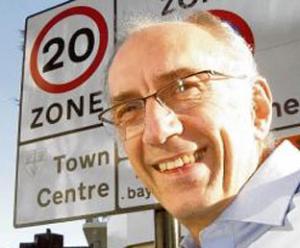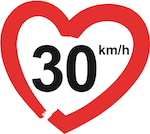Why do I support 30K speed limits
on Apr 11, 2013

Why would you support the 30Kmh campaign? Why are lower speed limits good for cyclists? What can be done about it? Here are some thoughts from the long time UK-bicycle user and road safety campaigner Rod King.
I started campaigning for 20mph/30kmh speed limits after a cycle trip to Hilden in North Rhine-Westphalia. There 23% of their in-town trips were by bicycle after implementing a 30kmh speed limit on almost all of their roads in 1991. It was cutting the relative speed between motor cars and cyclists that was seen as the single most important thing that could be done to make cycling safer and more comfortable. And for a cyclist at 22kmh the relative speed difference with a 40kmh car is 18kmh which drops to just 8kmh if the car is doing 30kmh. That means more than twice the distance and time for avoiding each other.
Livable streets
But there is much more than this which makes 30kmh as a default for urban and residential streets so important for cycling. It’s the fact that such a policy benefits pedestrians and drivers as much as cyclists. It’s a policy which provides universal benefits to the majority of the population rather than just the minority who cycle. It’s a policy that can dramatically improve the liveability of our streets with particular benefits for the young and old who may lack the mental acuity to assess the speed of vehicles or the physical agility to move quickly.
It is also a policy which questions our values about streets and how they are public spaces to be shared for the good of the whole community rather than simply roads for car drivers. It questions the benefits of driving at 40kmh+ in residential and urban roads and puts them against the wide public benefits that come from lower speeds with safer walking and cycling, quieter streets, less polluted streets and a far greater civic amenity.
Benefits for all
Of course lower vehicle speeds inevitably requires a change in behaviour and this can best be done when it provides benefits to the people whose behaviour we need to change. The driver is the father of the child who wants to walk or cycle to school, or is the daughter of the elderly person who wants to keep on walking to the shops regularly. It’s about the driver as a citizen creating better communities by understanding the benefits that driving slower brings to those communities.
Most importantly, by focussing on a single and widely beneficial initiative it brings together cyclists, pedestrians, children, elderly, disabled and civic amenity groups all in mutual support for behaviour change. It becomes the catalyst for a fundamental review of how we share our public spaces for transport.
You can find out more about ECF position on 30K here. And you can sign the initiative and make a friend sign it here
Of course this does not displace the need for properly designed cycle facilities, but does provide a foundation for safer and more equitable transport policies in our communities.
But the universal benefit of 30kmh speed limits and the desire for change goes far beyond a single country and can be harnessed across a complete continent. And that is the purpose of the European Citizen’s Initiative which is looking to gather and show support across the EU. Cyclists can make a huge difference for not only themselves but the whole of society by supporting this important initiative.
About the Author
Rod King founded 20’s Plenty for Us in 2007 to UK support community campaigners who wanted slower speed limits on their streets. It now has 189 local branches campaigning for mandatory 20mph speed limits in their communities. Many of the UK’s towns such as Liverpool, Oxford, Cambridge, Newcastle, Portsmouth, Brighton, together with many more have adopted a mandatory 20mph limit for most streets. In fact nearly 10m people now live in such communities.
See www.20splentyforus.org.uk @20splentyforus
Sign our European Citizens´ Initiative “30 km/h – making streets liveable!”


